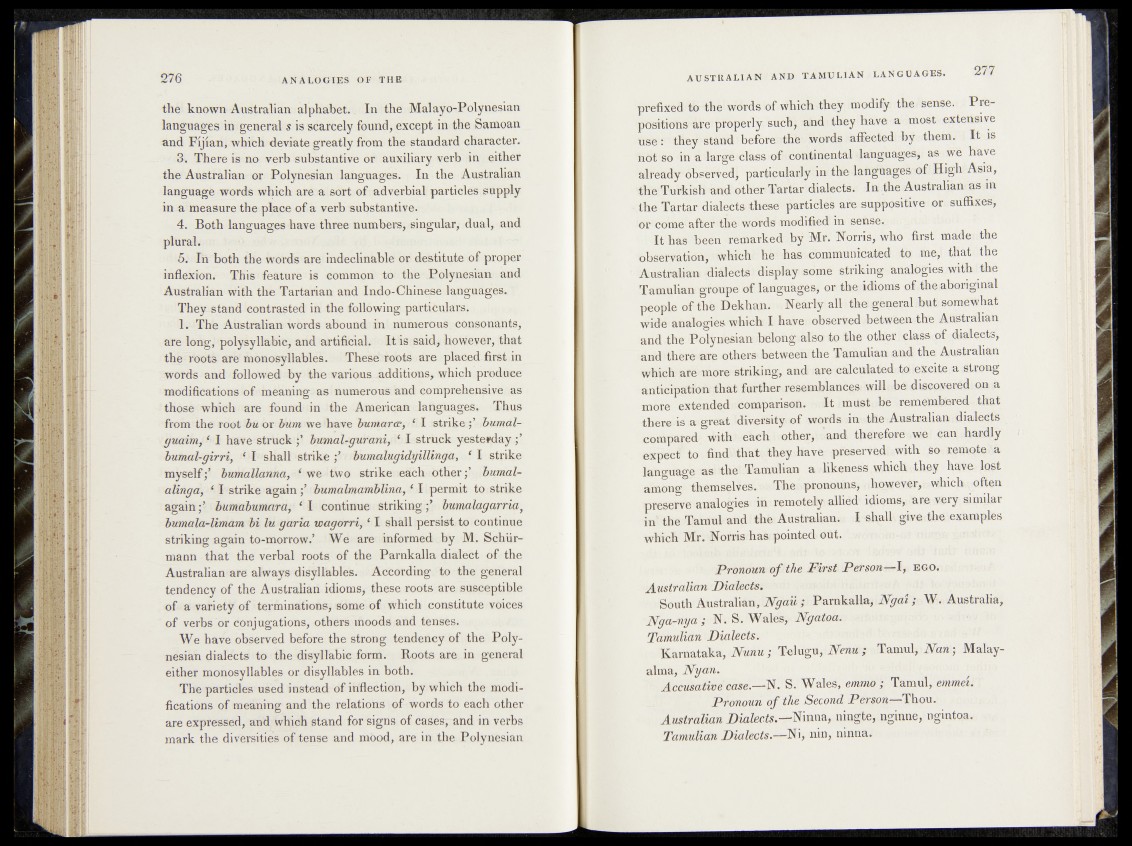
the known Australian alphabet.. In the Malayo-Polynesian
languages in general s is scarcely found, except in the Samoan
and Fijian, which deviate greatly from the standard character*
3. There is no verb substantive or auxiliary verb in either
the Australian or Polynesian languages. In the Australian
language words which are a sort of adverbial particles supply
in a measure the place of a verb substantive-
4. Both languages have three numbers, singular, dual, and
plural.
5. In both the words are indeclinable or destitute of proper
inflexion. This feature is common to« the Polynesian and
Australian with the Tartarian and Indo-Chinese languages. ’
They stand contrasted in the following particulars.
1. The Australian words abound in numerous consonants,
are long, polysyllabic, and artificial. It is said, however, that
the roots are monosyllables. These roots are placed first in
words and followed by the various additions, which produce
modifications of meaning as numerous and comprehensive as
those which are found in the American languages. Thus
from the root bu or bum we have bumaroe, H I strike f bumal-
guaim, ‘ I have struck ;’ bumal?gurMiij f I struck yesterday ;’
bumal-girri, ‘ I shall strike ;’ bumalugidyïllinga, £ I strike
myself;’ bumallanna, we two strike each other;’ bumal-
alinga, * I strike again ;’ bumalmamblina, ‘ I permit to strike
again;’ bumabumara, ‘ I continue striking;’ bumalagarria,
bumala-limam bi lu garia wagorri,11 shall persist to continue
striking again to-morrow.’ We are informed by M. Schiir-
mann that the verbal roots of the Parnkalla dialect of the
Australian are always disyllables. According to the general
tendency of the Australian idioms* these roots are susceptible
of a variety of terminations, some of which constitute voices
of verbs or conjugations, others moods and tenses.
We have observed before the strong tendency of the Polynesian
dialects to the disyllabic form. Roots are in general
either monosyllables or disyllables in both.
The particles used instead of inflection, by which the modifications
of meaning and the relations of words to each other
are expressed, and which stand for signs of cases, and in verbs
mark the diversities of tense and mood, are in the Polynesian.
prefixed tothê^words(éfswhich they modify, the. sense. Pre-
positioliswire properly such, and they have a, most extensive
use : ‘ they stand before' the Words -affected? by . them. It is
ndt so in adargeclass of • continental datiguages* as we have
already observed, particularly in thedanghages of High: Asia,
the Turkish and other-Tartar dialects.- In.the Australiuai as lfi
the Tartar dialects -these -particles affe suppositive or suffixes,
or come1 after the w0:rds.modifiedjin vSHfise. : ^! .;:«j: ihu'd ■
It has been remarked by Mr. Norris, who first made? the
ohseryariony 5 which jj he haeobmnmnioaâed dh thatüthp
Australian dialects'diéplay some sfrikingÿànsifigies,with!thé
Tamulian groupe of languages, or the^ idioms of .theiaboriginal
people of the Dekhan. vSMrlyialt the general ;but somewhat
wide analogies which I havej observed .between the Australian
and the Poly nesian.belong.alsoto the other j class of dialects*
and "there'are others between the Tamulian and the Australian
which are more striking, and are calculated, td teXcite;a strong
anticipation' that farther,TfiB«aJi^Bc^i! on#
more extended comparison. It imuatube remembered that
thereis aygreitt IdiveBsityvof words 4mstlte iAustralian.ildialeGts
compared with^-each other, niand th e re fe vwéi can hardly
expect' to find that, they have preservedi with ,so remote \a
language as: the Tamulian a dikeness,w )m k -they h a ^ J a s t
among themselVes.v The pronouns* diowey©r,>sv|hic^V:often
preserve analogies: in remotely ajli<!d> idioms, temsmS similar
in the Tamul and the Australian. I chalk gtve* thé examples
which Mr. Norris has. pointed out.
Pronoun o f the First Person-r-\, ego.
Australian Dialects.
South Australian, Ngaü ; Parnkalla* Wgaî ; W. Australia,
Nga-nya ; N. S. Wates,- iifyafoa.
Tamulian Dialects.
Karnataka, Nunu ; Tel ugu, M n u g jg Tamul, :Man ; Malay-
alma, Nyan.
Accusative case.—N. S. Wales, emmo ; Tamul, emmet.
Pronoun o f the Second Person—Thou.
Australian jDiafecfe.-^-Ninna, niugte* nginne, ngintoa.
Tamulian Dialects.—Ni* nin, ninna.